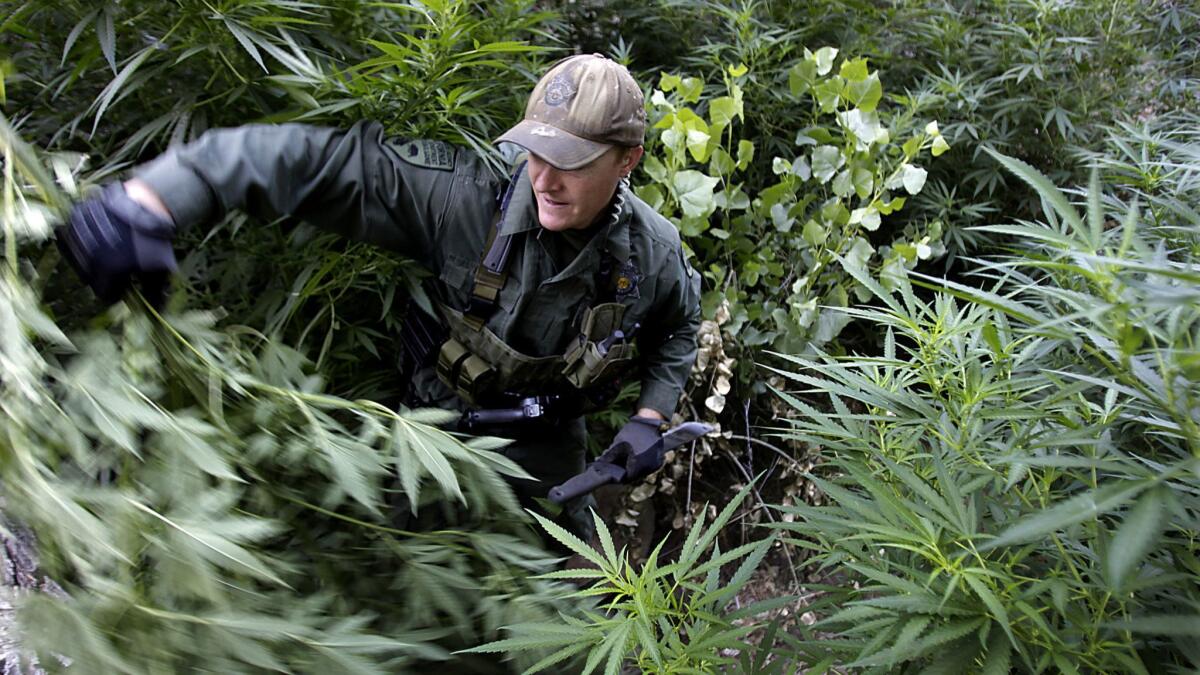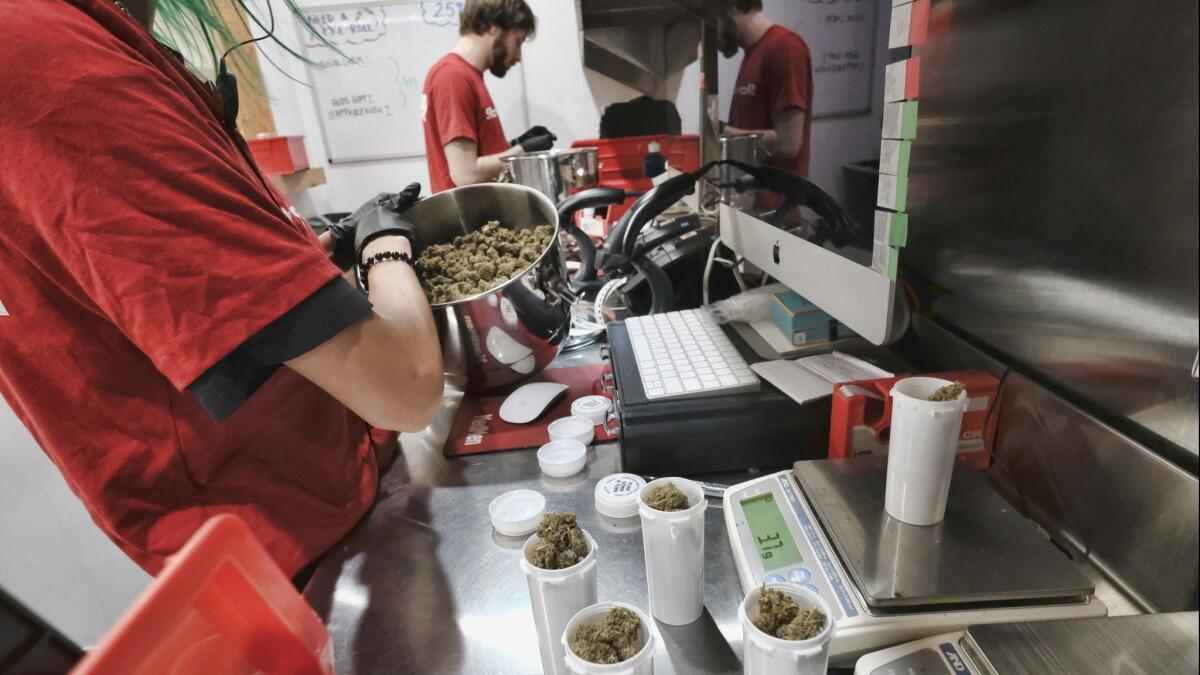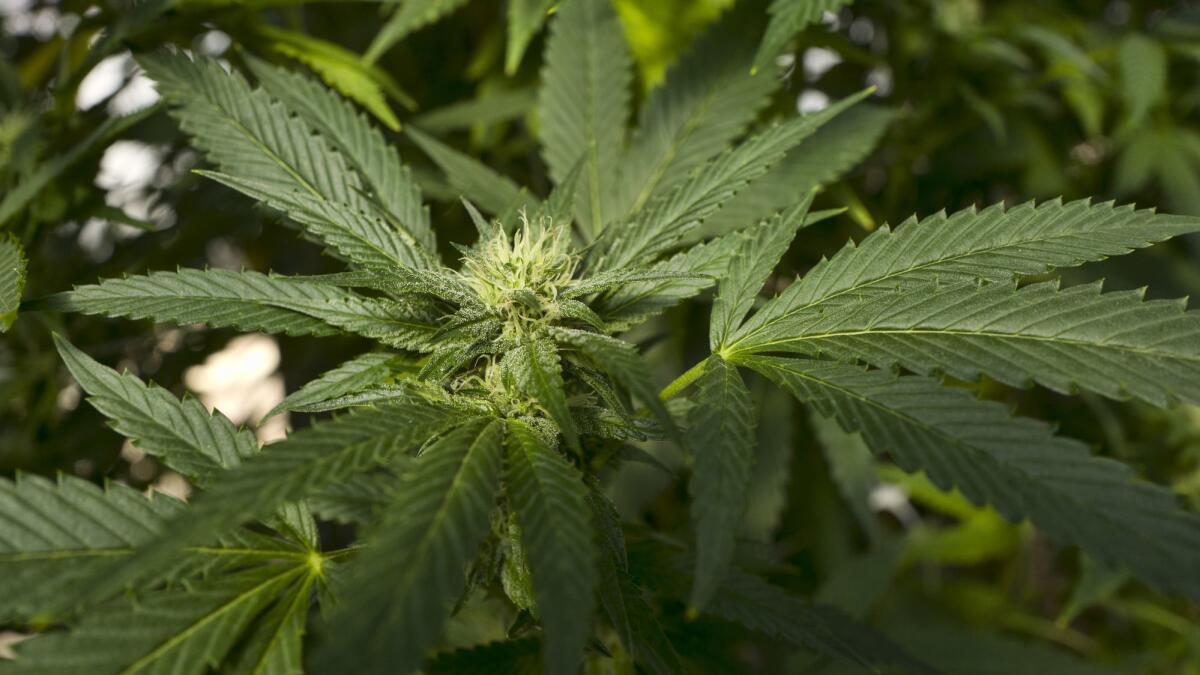California’s black market for pot is stifling legal sales. Now the governor wants to step up enforcement

Reporting from Sacramento — Before he was elected governor, Gavin Newsom was instrumental in legalizing marijuana for recreational use in California. Now, as he settles into office, he faces the challenge of fixing a system that has been slow to bloom.
Newsom has urged patience with sluggish growth in the number of state-licensed cannabis businesses, saying he expected that such a complex regulatory system would take at least five years to fully develop.
But a new report from the state Cannabis Advisory Committee on the first year of legal pot sales in California says there is problem that requires urgent action: “Fragmented and uncoordinated” enforcement has allowed the black market to flourish, threatening licensed business with unfair competition.
“Lack of enforcement is creating a thriving environment for the unregulated ‘underground market,’ ” said the 22-member panel, which was appointed by former Gov. Jerry Brown.
Last week, Newsom announced an expansion of efforts by the California National Guard to work with federal officials to target the black market, including illegal drug grows in Northern California operated by international drug cartels.
“There are legitimate concerns in Northern California particularly as it relates to illegal cannabis grows. They are getting worse, not better,” Newsom said.
The governor proposed that at least 150 California National Guard troops would be redeployed from the U.S.-Mexico border to join a federally funded Counterdrug Task Force. The new forces would focus on illicit cannabis activity in Northern California.
Newsom said recently that he would address the black market with a carrot-and-stick approach that would “move expeditiously at licensing more and more dispensaries” while also “making sure we go after the bad actors.”
“I want to see more enforcement,” Newsom told reporters two days after the critical advisory committee report was released.
As much as 80% of the marijuana sold in California comes from the black market, according to an estimate by New Frontier Data, a firm that tracks cannabis sales and trends. Analysts also found that California’s illicit pot market was valued at an estimated $3.7 billion last year, more than four times the size of the legal market.
Enforcement by the state has been hampered by a lack of resources, a decision to give new firms ample time to comply with complex regulations and political disputes, according to state records and interviews with officials and industry insiders.
Newsom has a special interest in ensuring that the state-sanctioned cannabis industry flourishes in California a year after the state began issuing licenses. As lieutenant governor, while gearing up to run for the state’s top spot, he chaired the Blue Ribbon Commission on Marijuana Policy, whose recommendations led to Proposition 64, approved by voters in 2016 to legalize growing and selling marijuana for recreational use.
His campaign for governor received more than $340,000 from the cannabis industry, which is optimistic that the Newsom administration will address some of the lingering problems with the licensing system.
“We believe that this governor is committed to addressing our concerns, and he has a Legislature that is showing their willingness to author bills that will strengthen the regulated market while minimizing the illicit market,” said Josh Drayton, a spokesman for the California Cannabis Industry Assn.

So far, the number of sellers and growers getting state licenses is significantly less than many in the industry expected — a result of high taxes, city bans on pot businesses and the large underground market, experts said.
“Enforcement in the past has been expensive and ineffective,” said Hezekiah Allen, the chairman of Emerald Grown, a cooperative of 130 licensed cultivators. “If we had a robust and thriving regulated market, it is possible that enforcement might help. We don’t, though.”
The state Bureau of Cannabis Control, which has licensed 634 pot retailers, has sent out 2,842 cease-and-desist letters to cannabis shops and businesses suspected of operating without state licenses.
State regulators have announced five enforcement actions — including cannabis seizures — against retail businesses in Sylmar, Sacramento, Los Angeles, Fair Oaks and Costa Mesa for operating without a license. The state’s actions have resulted in 15 people being charged with violating state law.
Bureau spokesman Alex Traverso said it’s not clear how many other illegal pot shops closed down after getting warnings.
“It’s difficult to say how many of those letters resulted in action,” Traverso said. “Businesses could shut down and relocate.”
The limited action by the state bureau has meant cities, which have strained resources, have had to step in against illegal operators.
The Los Angeles city attorney’s Marijuana Enforcement Unit filed 170 misdemeanor cases last year against 700 defendants for operating commercial cannabis businesses without a license, said spokesman Frank Mateljan.
A year ago, the state bureau sent a letter to tech company and dispensary database Weedmaps, telling it to stop advertising sellers that lack a permit.
“Your website contains advertisements from persons offering cannabis and cannabis products for sale that are not licensed to conduct commercial cannabis activity; therefore, you are aiding and abetting in violations of state cannabis laws,” wrote Lori Ajax, chief of the Bureau of Cannabis Control.
The firm responded to the bureau and argued it is a service site like Google, Craigslist or Yelp and therefore subject to “federally preemptive protections.” No action was taken against the company by the state.
“We continue to engage in constructive dialogue with state and local authorities,” said Carl Fillichio, a company spokesman.
Bureau officials say they are limited in what they can do.
“The issue is out of our hands now since Weedmaps is not a licensee of the Bureau,” Traverso said.

In November, less than a week after Newsom’s election, Weedmaps hired a lobbying firm headed by Kevin Schmidt, who was policy director for then-Lt. Gov. Newsom for five years ending in 2016. The firm more recently hired Jason Kinney, who was a top advisor on Newsom’s gubernatorial transition team, although he plans to focus on non-cannabis clients of the lobbying firm, including AT&T.
Newsom was asked about Weedmaps at his budget briefing on Jan 10.
“I’m not going to get into a specific company,” he said. “But if somebody’s doing something wrong, they should be held accountable. Period. Whoever they are and whatever industry they are.”
Before Newsom took office, other efforts to step up enforcement had failed, including a bill that would have allowed fines against companies that advertise without listing their state license number. Another bill that died, by Assemblyman Tom Lackey (R-Palmdale), would have put the California Highway Patrol in charge of enforcement.
“Enforcement has been a joke,” said Lackey, a retired CHP sergeant. “Right now, you have the state and locals blaming each other as to who should be responsible for enforcement.”
Perhaps the biggest setback for tougher enforcement was a result of a dispute last year between Brown and Democratic leaders in the state Assembly. Brown proposed in his final budget to provide $14 million to create five enforcement teams — each located in a different part of the state — to investigate California’s black market for marijuana, with an emphasis on going after drug cartels and gangs. But negotiations stalled last year in a dispute over how to pay for the program.
Newsom sent a letter to Washington last week asking the federal government for funds to expand the California National Guard’s role in the Counterdrug Task Force.
His first budget for 2019-20 proposes to continue funding for enforcement at about the level of this year, $40 million, said H.D. Palmer, a spokesman for the state Department of Finance.
Industry officials are concerned that the Bureau of Cannabis Control enforcement efforts have also been hampered by a lack of staff. The bureau has filled only 77 of its 147 budgeted positions. Traverso said the agency wants to make sure it hires the right people and denies that the understaffing is impacting enforcement.
Scattered enforcement responsibilities are also an issue, according to the report by the state advisory panel. Cannabis growers are required to get a license from the California Department of Food and Agriculture, but that agency is only authorized to enforce rules with licensed cultivators.
The agency “does not have statutory authority over illegal cannabis cultivation, so we do not issue citations to unlicensed cannabis growers,” said Rebecca Forée, a spokeswoman for the department.
Long before Proposition 64, the state Department of Justice raided and eradicated illegal grows, often in cooperation with federal and local authorities. But that effort, too, has run into bumps.
In 2011, state budget cuts were cited as the reason to eliminate the Bureau of Narcotics Enforcement, which had been working with regional task forces to combat illegal drugs.
A separate state DOJ program called the Campaign Against Marijuana Planting has had mixed success. The amount of processed marijuana seized has gone up from 8,696 pounds in 2017 to 41,465 pounds last year. But the number of plants eradicated by the program has dropped in recent years, from 4.4 million in 2009 to only 614,267 plants last year. The numbers go up and down from year to year based in part on how many grows are discovered.
The state DOJ is just one agency that enforces cannabis laws.
The California Highway Patrol seized 16,928 pounds of marijuana last year, down from the peak of 21,388 pounds in 2014.
Separately, the California Department of Fish and Wildlife last year sent officers on 103 missions targeting illegal trespass grows, much of it on public property such as state and county parks. A cleanup that lasted from December to January removed 500 plants in an illegal grow in Orange County’s Laguna Coast Wilderness Park.
All told, last year the agency eradicated 1.5 million plants, more than double that from the year before.
Industry leaders say focusing and coordinating enforcement is just one way to reduce illegal operators. The state should also make it easier for growers and sellers, including mom-and-pop operators, to join the licensed market, said Allen, the former head of the California Growers’ Assn.
“California must be very careful not to let enforcement become a tool that the haves use to further shut out the have-nots,” Allen said.
But Newsom said last week that he has always believed strong enforcement was necessary to the success of a regulated cannabis industry.
“We have to hold accountable those that are not participating in the legal market, particularly those that are continuing to profit off of illegal grows,” he said.
Twitter: @mcgreevy99
More to Read
Get the L.A. Times Politics newsletter
Deeply reported insights into legislation, politics and policy from Sacramento, Washington and beyond. In your inbox three times per week.
You may occasionally receive promotional content from the Los Angeles Times.











